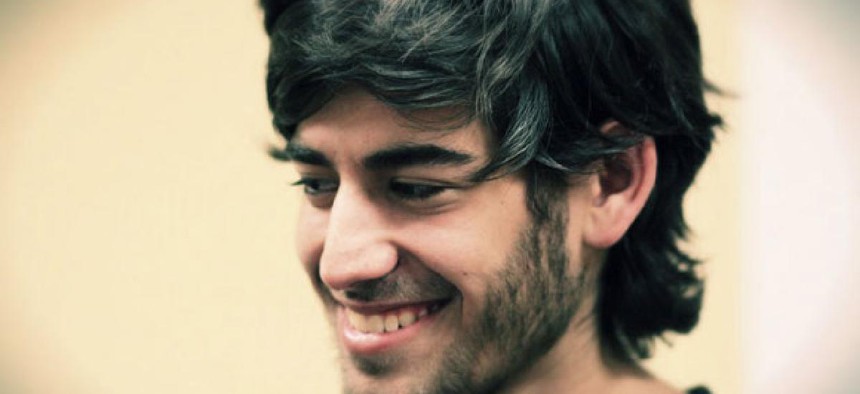Aaron Swartz and how a martyr makes a law

Flickr user ragesoss
The death of Internet activist is propelling a change to a computer law written before there was an Internet.
Congress enacted the Computer Fraud and Abuse Act in 1984, before there was a World Wide Web. And yet, it took Internet wunderkind Aaron Swartz’s apparent suicide for efforts to reform it to get traction. Sometimes to make a law, it takes a martyr.
Swartz died in the midst of a controversial trial. In 2010, he downloaded millions of academic papers from the JSTOR database. For him, this was likely a political act. He believed all journal information should be free. Federal prosecutors in Boston thought otherwise.
Even though JSTOR didn't pursue legal action against Swartz, the text of the Computer Fraud and Abuse Act (CFAA) allowed for criminal charges. Swartz's allies argued that the criminal proceedings didn't fit the crime, saying federal prosecutors were trying to make an example of him. The word "persecution" — not "prosecution" — often appears in discussions of what happened. He was facing up to 35 years in prison. However, it was more likely that he would serve less than a year in a minimum-security setting. His allies argue that this is what led Swartz to take his own life.
Now, in death, his accomplishments, coupled with his connections in Washington, are galvanizing to establish a law—“Aaron’s Law”— that would exonerate him.
It's hard to talk about Swartz without painting him as a mythical figure. He taught himself to read at the age of three. He invented the RSS protocol during his teenage years. He was a big thinker, and penned manifestos on information freedom. He read economics textbooks for fun. And he cofounded Reddit. He died at 26 years old, leaving many to wonder what potential was lost with him.
There's an emotional weight, a narrative that gets tied to this piece of legislation, which became clear Monday night at a memorial for Swartz on Capitol Hill.
It was a crowd of contrasts in the after-hours Cannon caucus room. Liberal Sens. Elizabeth Warren, D- Mass., and Ron Wyden, D-Ore., sat not too far from Republican Rep. Darrell Issa of California. There were also more colorful figures, including a man whose back-length dreadlocks adorned with bits of colored string and beads clacked around as he approached his seat. And yes, there were a lot of twentysomethings with beards.
Rep. Alan Grayson, D-Fla., whom Swartz interned for, likened him to Alan Turing and Socrates, great thinkers who met too-soon deaths due to external pressures. “What we engage in is human sacrifice," he said of these figures. Wyden, in a more head-scratching speech, likened Swartz to a hero in Henry Climbs a Mountain, a children's book, who climbed an imaginary mountain without wearing any shoes. Regardless of the comparison made, it was clear: To them, Aaron was a growing legend unjustly cut down in his prime. Though not everyone spoke in such lofty terms. Berin Szoka, president of the libertarian-leaning group Tech Freedom, was heckled at when he said Swartz was wrong in taking the JSTOR documents. In his view, copyrights should be respected; instead, it's an overly broad law and a harsh justice system that are in need of reform.
But for many advocates, Swartz is a martyr for Internet openness. While those who were close to him shy away from that portrayal, they do intend on using his memory as motivation for change.
"I think of a martyr as someone who made a decision to stand up for something that they knew could cost them their life," Taren Stinebrickner-Kauffman, Aaron's romantic partner, says. "Aaron didn't go download those articles, knowing that it could cost him his life. I don't think he even seriously considered the idea that he could be arrested for it."
To her, Aaron was more human than his accolades might imply. He was a stubborn but reliable person who "asked for forgiveness, not for permission." Stinebrickner-Kauffman and Aaron's father have maintained that it was the pressure of the prosecution that brought Aaron to his death, not depression, as others have reported. Let's assume they've come to this conclusion based on personal reflections. However, the story does add fuel to the idea that Aaron was a martyr.
Democratic Rep. Zoe Lofgren, who represents Silicon Valley, is working on a draft of "Aaron's Law." The legislation would have essentially redeemed Aaron. In downloading the millions of articles, he breached JSTOR’s terms of service. “Aaron’s Law” would make it so that breach of contract was not a federal crime. The case would have been dropped when JSTOR dropped it.
In a fitting way, Lofgren has been posting versions of it to Reddit, asking the Internet community for improvements. "When I heard" about the suicide, Lofgren says, "I was so outraged about his death, and I really thought to myself and I e-mailed my staff, tell me what needs to be changed in the law that you could charge this young man with 13 felonies for 35 years."
While Issa, chairman of the House Oversight Committee, focused more on the justice implications than computer fraud, he too, spoke of using Swartz’s memory to make changes. "The issues that Aaron has left behind and the causes that he believed in are ones that I believe will live on in this Congress, " he said. With a bipartisan effort underway “many of those issues are going to be doubled downed on because of his sacrifice."
It doesn't need to be explained in great detail how tragedy can be a catalyst for reform; just look at the momentum on gun control built from the Sandy Hook shooting. Stinebrickner-Kauffman realizes this, and hopes some good can come of the tragedy.
"Nothing is ever going to make up for his death," Stinebrickner-Kauffman says. "But Aaron would have wanted us to do as much in his name as we can. This CFAA reform is something that we have a real chance of accomplishing."
NEXT STORY: First U.S. patriot battery goes live in Turkey






